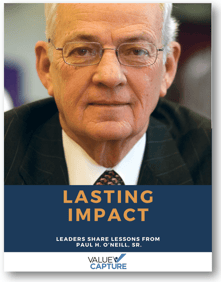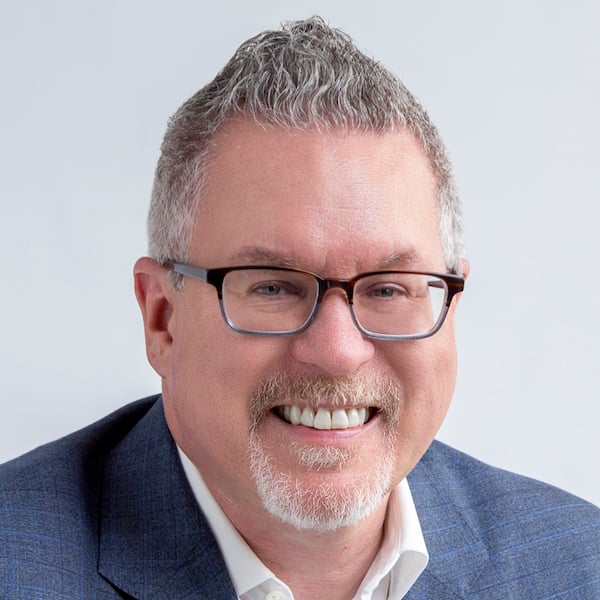Value Capture is excited to announce the release of our second free eBook in our "Habitual Excellence" series of publications. The new book is titled, Lasting Impact: Leaders Share Lessons from Paul H. O'Neill, Sr.

Today, December 4th, would have been the 85th birthday of Paul H. O'Neill, Sr., so we are releasing the book today to honor and remember him after his passing in April.
The leadership lessons that he taught are timeless. And our latest book, written by George Taninecz, is a collection of stories and reflections from leaders who learned from Mr. O'Neill. The book shows how these leadership practices and mindsets live on and will continue to be taught and passed on to others.
We hope that you'll download the book. Feel free to share it with others. See all book excerpts.
Excerpt:
New Approach to Leadership
Many leaders in all walks of life would be pleased to be remembered for a single leadership characteristic. Those who worked alongside O’Neill identify many ways in which he changed business leadership. They witnessed these revolutionary — yet for O’Neill routine — characteristics, and learned how to apply them in their own roles.
Respect for People
O’Neill led from a belief that people want to and can do great things, articulating his respect for people in a simple framework. He said that “in an organization that has the potential for greatness, it’s possible every day for every human being in that enterprise to say ‘yes’ to three questions without any reservations:”[1]
- Am I treated with dignity and respect by everyone I encounter without regard to race, gender, rank, educational attainment, or any other distinguishing feature?
- Am I given the tools, training, resources, encouragement, etc., to make a contribution to the organization that adds meaning to my life?
- Am I recognized for that contribution by someone whose opinion matters to me?
Gary Kaplan, MD, Chairman and CEO of Virginia Mason Health System in Seattle, met O’Neill at an Institute for Healthcare Improvement event in December 2002, and they soon became good friends and colleagues. Dr. Kaplan has led Virginia Mason, the first healthcare provider to implement lean management principles throughout a hospital system and patient-care practices, for 21 years. “In many ways I was inspired by Paul’s deep respect for the frontline worker and a belief that a workplace be respectful and the worker be [able to] answer ‘yes’ to all three of his questions that he often asked.”
Dr. Kaplan embraced the questions as a foundation for respect for people, and they led him to implement mandatory respect-for-people training at Virginia Mason that all employees attended, including physicians, in 2011 and 2018. “A lot of physicians are enculturated the same as I was: the buck stops with you, you’re a solo actor, you’re to be respected, you’re on a pedestal. And that’s not what we need today... Today it’s about teamwork, collaboration, respectful interactions, empowering the frontlines, and skill/task alignment.”
The three questions posed by O’Neill also transformed Cliff Orme, President of International Hospital Corporation, a hospital investment, and management company headquartered in Dallas that has built or acquired and successfully managed hospitals in Latin America.
“The lesson I learned — and it changed me forever — was that every day, every worker at the hospital needs to be treated with respect.”
After reciting the three questions, he adds, “These conditions are my responsibility. So I started preaching that message to the employees. And every time I did, I just saw their eyes light up, and they connected with me in a way that I’ve never connected with employees before.”
“His three questions still resonate with everything we do today, everything I believe in,” says John Toussaint, MD, Executive Chairman of Catalysis, former CEO of the ThedaCare health system, and author of books including Management on the Mend and the recently released Becoming the Change. Since 2008, Catalysis, a partner of Value Capture, has focused on educational programs and resources designed to transform healthcare value. “
I think those [three questions] are the core elements of respect, and I think that’s really what the focus of organizational excellence is really all about. It’s about respect and building that culture of respect. It’s about making sure that people have the environment — the training, the tools, the cultural environments, the work that gives their life meaning — and then to say ‘thank you’ and celebrate the work that people do every day. I think those elements of his legacy will live on forever, at least for our work.”
O’Neill’s respect for people was without exception, says Stephen Muething, MD, Chief Quality Officer at Cincinnati Children’s Hospital Medical Center. “If we were at a dinner or at some event, I saw him talking to everybody the same way, with the same respect, the humble man that he was... I never saw him not that way, which was more impactful than anything. There was no onstage Paul O’Neill and offstage Paul O’Neill.”
“Initially I was struck by Paul’s absolute candor and the genuine warmth and respect that he showed for everyone in the organization regardless of rank or position,” says Kevin McKnight, a Value Capture Senior Advisor and an independent consultant focused on sustainability and environment, health, and safety who spent 35 years at Alcoa. “Paul addressed everyone in the organization by their first name, and he actually made it a point, even very early on, to know everyone’s name. I remember I was blown away by how good he was at remembering names... That simple act of learning everyone’s name and greeting them by their first name just demonstrated such enormous respect for each individual.”
Steven Spear, principal of HVE LLC, senior lecturer at MIT, and author of books including The High Velocity Edge, says,
“The thing that I really took away from him was everyone matters. My faith and my upbringing and life experiences have certainly informed that point of view, but Paul gave it a boost, which was phenomenal because here was a guy with the responsibilities and authorities he had, and he spoke about it all the time. I mean, it wasn’t like every now and again it came up, but it was all the time about everybody in every situation. And if a guy like that can talk about it all the time, you realize, this matters. This is not just like, ‘Oh, yeah, I’ll throw some lip service at it.’ This is the real deal.”
Spear recalls working with O’Neill and a group of senior executives when Alcoa was implementing the Alcoa Business System: “One can imagine someone with Paul’s life attributes not paying attention to ‘the kid.’ I mean, 33 doesn’t sound that young, but relative to the other people who were in their 50s and 60s, I was the kid. Yet he made no distinction. If I had something to say, he listened with respect, and if it was right, he processed it and said, ‘Thank you.’ And if it was wrong, he told me in a very respectful fashion... I got treated in a way that really reinforced the truth of saying that he believed everyone counted because, in that group, I was the guy who didn’t necessarily need to count.”
While attending Harvard Business School, Vickie Pisowicz, Value Capture Senior Advisor, heard an O’Neill presentation to first-year students: “We had just completed a case study that involved Alcoa, worker safety, and what it meant to lead a successful organization with a values-based approach. At the end of day, Paul was invited to address the HBS first-year student body. Alcoa’s success — the numbers and the financials — were irrefutable. Hearing about how Paul transformed the company, starting with a deep respect for people and the moral imperative of worker safety at the ‘West Point of Capitalism,’ was, needless to say, memorable.”
Pisowicz later interned at Alcoa and remembers her first day. “Paul came to my office and made a special point to welcome me to the company, and say how really important it was for me to be there, and how he was looking forward to working together,” she says, adding that this kind of respect for people and equality was pervasive throughout the company and reflected O’Neill’s leadership.
Pisowicz eventually joined Alcoa full time as a manager in the Alcoa Business System Group; she also worked with O’Neill at the Pittsburgh Regional Health Initiative (PRHI). “One of the things that I take away from Paul is that with respect to people, he really viewed every single interaction between himself and another person, between any two people, as an opportunity for two-way learning. There was this idea of ‘I respect you. I respect your point of view. I respect that you have something to offer. How can we learn together?’ He did that with every single person, no matter who you were or what your position you held. He was really, and genuinely, interested in you as a person, what ideas you had, and what could be learned together.”
[1] “Paul O’Neill CEO of Alcoa, it’s all about safety,” YouTube, June 12, 2015.
Get the Full eBook (Free PDF):

Written by Mark Graban
Mark Graban has served healthcare clients since 2005. Mark is internationally recognized as a leading author and speaker on Lean healthcare. His latest book is "The Mistakes That Make Us: Cultivating a Culture of Learning and Innovation."


Submit a comment